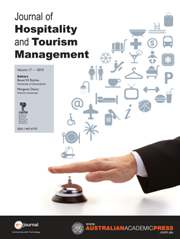Crossref Citations
This article has been cited by the following publications. This list is generated based on data provided by
Crossref.
Baum, Tom
and
Devine, Frances
2007.
Skills and Training in the Hotel Sector: The Case of Front Office Employment in Northern Ireland.
Tourism and Hospitality Research,
Vol. 7,
Issue. 3-4,
p.
269.
Baum, Tom
2007.
Human resources in tourism: Still waiting for change.
Tourism Management,
Vol. 28,
Issue. 6,
p.
1383.
D'Annunzio‐Green, Norma
and
Baum, Tom
2008.
Implications of hospitality and tourism labour markets for talent management strategies.
International Journal of Contemporary Hospitality Management,
Vol. 20,
Issue. 7,
p.
720.
Veijola, Soile
2009.
Gender as Work in the Tourism Industry.
Tourist Studies,
Vol. 9,
Issue. 2,
p.
109.
Yang, Jen-Te
2009.
Facilitating or Inhibiting Newcomer Socialisation Outcomes in International Hotels.
Tourism and Hospitality Research,
Vol. 9,
Issue. 4,
p.
325.
Stephenson, Marcus L.
Russell, Karl A.
and
Edgar, David
2010.
Islamic hospitality in the UAE: indigenization of products and human capital.
Journal of Islamic Marketing,
Vol. 1,
Issue. 1,
p.
9.
King, Ceridwyn
Funk, Daniel C.
and
Wilkins, Hugh
2011.
Bridging the gap: An examination of the relative alignment of hospitality research and industry priorities.
International Journal of Hospitality Management,
Vol. 30,
Issue. 1,
p.
157.
Cholwill, Martin
2011.
Cruise Sector Challenges.
p.
79.
Maumbe, Kudzayi Chitiyo
and
van Wyk, Laeticia
2011.
Addressing the Skills Shortage Problem of the South African Tourism and Hospitality Industry: An Evaluation of the Effectiveness of the 2007/2008 SA Host Training Program in the Western Cape Province.
Urban Forum,
Vol. 22,
Issue. 4,
p.
363.
Jauhari, Vinnie
Bharwani, Sonia
and
Butt, Neetu
2012.
Challenges for the global hospitality industry: an HR perspective.
Worldwide Hospitality and Tourism Themes,
Vol. 4,
Issue. 2,
p.
150.
Elgammal, Islam
and
Wilbert, Chris
2013.
Tourism mobilities, marriages and ‘mimicking’: some experiences of domestic migrant tourist workers in Sharm Elsheikh.
Annals of Leisure Research,
Vol. 16,
Issue. 4,
p.
332.
Duncan, Tara
Scott, David G.
and
Baum, Tom
2013.
THE MOBILITIES OF HOSPITALITY WORK: AN EXPLORATION OF ISSUES AND DEBATES.
Annals of Tourism Research,
Vol. 41,
Issue. ,
p.
1.
Bharwani, Sonia
and
Jauhari, Vinnie
2013.
An exploratory study of competencies required to co‐create memorable customer experiences in the hospitality industry.
International Journal of Contemporary Hospitality Management,
Vol. 25,
Issue. 6,
p.
823.
Beesley, Lisa G.
and
Davidson, Michael
2013.
A Critical Analysis of Skilled Labor Supply and Demand in the Australian Hospitality Industry.
Journal of Quality Assurance in Hospitality & Tourism,
Vol. 14,
Issue. 3,
p.
264.
Szende, Peter
Pang, Jessica Karmen
and
Yu, Huanjia
2013.
Experience Design in the 13th Century: The Case of Restaurants in Hangzhou 体验十三世纪设计—以杭州餐馆为例.
Journal of China Tourism Research,
Vol. 9,
Issue. 1,
p.
115.
Dahms, Sven
2015.
International Hotel Strategy and Institutional Distance: A Conceptual Framework.
SSRN Electronic Journal,
Sørensen, Flemming
and
Jensen, Jens Friis
2015.
Value creation and knowledge development in tourism experience encounters.
Tourism Management,
Vol. 46,
Issue. ,
p.
336.
Navarro, Susana
Garzón, Dolores
and
Roig-Tierno, Norat
2015.
Co-creation in hotel–disable customer interactions.
Journal of Business Research,
Vol. 68,
Issue. 7,
p.
1630.
Baker, Melissa A.
and
Magnini, Vincent P.
2016.
The evolution of services marketing, hospitality marketing and building the constituency model for hospitality marketing.
International Journal of Contemporary Hospitality Management,
Vol. 28,
Issue. 8,
p.
1510.
Stansbie, Paul
and
Nash, Robert
2016.
Customizing Internship Experiences by Emphasis Area: The Key to Increased Satisfaction and Motivation in Hospitality and Tourism Management Students.
Journal of Hospitality & Tourism Education,
Vol. 28,
Issue. 2,
p.
71.




